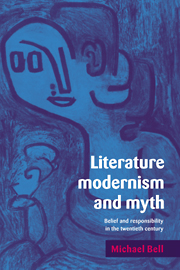4 - The politics of modernist mythopoeia
Published online by Cambridge University Press: 18 December 2009
Summary
JOSEPH CONRAD AND THE ‘AFRICA’ WITHIN
By the latter half of the twentieth century the very idea of myth had become irremediably tainted through its co-option by fascism. Despite the hopeful efforts of Thomas Mann and Karl Kerenyi to keep myth as a humanistic resource, the political conservatism of several modern writers, including Pound's commitment to Mussolini, gave a strong colour of conviction to the view that this association was an intrinsic one. The sentimental literary acquiescence in the mythic by much Anglo-American academic criticism, or the covertly religious system building of Northrop Frye, only reinforced this interpretation, while Adorno and Horkheimer's Dialectic of Enlightenment provided a classic left analysis supporting such a view; although the inner structure of their argument actually leaves itself open to other evaluations, in so far as they present myth not just as a primitive power to be escaped but as an inner and inescapable correlative of Enlightenment itself. From this standpoint it might be more productive to recognise myth as a power to be lived with; and to be understood critically from within. That is one of the strong implications of the modernist writers discussed so far, and it is a more than theoretical possibility, for although the idea of myth, particularly in leftish critique, has now acquired almost invariably a reductively negative slant, a great deal of the literature of the latter part of the century has been conducting a nuanced and critical participation in the mythic. The positive significance of myth as embodied in modernism does live on, but is largely unrecognised both in its meaning and in its ancestry.
- Type
- Chapter
- Information
- Literature, Modernism and MythBelief and Responsibility in the Twentieth Century, pp. 148 - 158Publisher: Cambridge University PressPrint publication year: 1997



